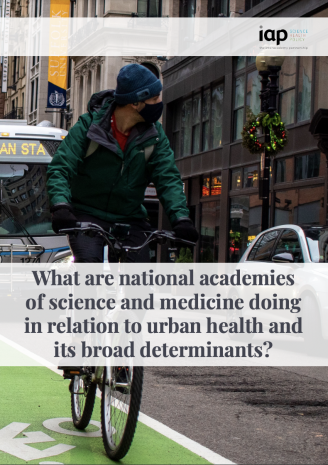Urbanisation continues apace in all regions of the world, producing opportunities for creative, connected societies and their constituent communities to thrive but bringing a range of potentially devastating implications for health and wellbeing – from social exclusion to air pollution to chronic diseases and novel communicable diseases. The Sustainable Development Agenda 2030 (UN General Assembly, 2015), the New Urban Agenda (UN-Habitat, 2016), the Paris Agreement (UN, 2015) and the Sendai Framework (UNODRR, 2015) all recognise the challenges of urbanisation, its impacts on health, wellbeing and equity in the short and longer term, and cities’ roles in global health development. Urban health, a key concern of the UN Sustainable Development Goals (SDGs), is a grand challenge of our time. It is described by scholars as being concerned with understanding how features of cities influence the health of urban populations, thus pointing the way to interventions that can improve health. An understanding of urban health requires a grounding in the fundamentals of causal thinking. How do cities influence the health of populations? (Galea, Ettman & Vlahov, 2019).
Cities and urban governance are moving to the forefront of research concerning human health as well as planetary health, however “the extent to which health and its promotion will be prioritised as a basis for decision-making is an open debate” (Fudge & Fawkes, 2017). Evidence-informed decisionmaking will need to call on the work of our best scientists from across the world. The InterAcademy Partnership (IAP) is the global network of science, engineering and medical academies that facilitates collaborations for providing independent expert advice on scientific, technological and health issues.
By commissioning this project, IAP sought to understand what national academies have been doing in the field of urban health and its broad determinants. A proposition underpinning this project was that academies have been engaged in a range of urban health-related scientific endeavours but their orientation to urban health may be under-developed or under-recognised. By strengthening this orientation, a major opportunity exists for academies to grow their relevance to societal problems, profile, effectiveness and impact. A desktop review of academy websites and interviews with several academy leaders offered insights into the diverse types and topics of activities in which the academies in Africa, the Americas, Asia Pacific and Europe were engaged between 2017 and 2021. Partnerships featuring in these activities were also reviewed. Importantly, this timeframe spanned the first two years of the COVID-19 pandemic, which triggered severe disruptions across all facets of life that were unimaginable for most governments, businesses and communities. Many scientific activities around the world were slowed, delayed or ceased during this period.

